Local Governments and Autonomous Territories
A. GENERAL PROVISIONS
Section 1. The territorial and political subdivisions of the Republic of the Philippines are the provinces, cities, municipalities, and barangays. There shall be autonomous territories in the country as provided in this Article. The Autonomous Region of Muslim Mindanao shall continue to exist until a federal system of government is hereby established (creating the State/Sultanate of BangsaMoro in the ARMM’s place).
Section 2. The State shall ensure that the territorial and political subdivisions shall enjoy local autonomy.
Section 3. Parliament shall strengthen the existing Local Government Code to provide for a more responsive and accountable local government structure instituted through a system of decentralization and devolution with effective mechanisms of recall, initiative, and referendum, allocate among the different local government units their powers, responsibilities, and resources. The Code shall provide for the qualifications, election, appointment and removal, term, salaries, powers and functions and duties of local officials, and all other matters relating to the organization and operation of the local units.
Section 4. The Prime Minister shall exercise general supervision over local governments. Provinces with respect to component cities and municipalities, and cities and municipalities with respect to component barangays shall ensure that the acts of their component units are within the scope of their prescribed powers and functions.
Section 5. Each local government and autonomous territory shall have the power to create its own sources of revenues and to levy taxes, fees and charges subject to such guidelines and limitations as Parliament may provide. Such taxes, fees, and charges shall accrue to the concerned local governments or autonomous territories.
Section 6. The National Government is mandated to provide local governments their just share, as determined by law, in the national taxes, which shall be automatically released to them, subject to the mechanism of retention under a federal system.
Section 7. Local governments shall be entitled to an equitable share in the proceeds of the utilization and development of the national wealth within their respective areas, including but not limited to off-shore sites beyond municipal waters, in the manner provided by law, which shall be automatically released to them, including sharing the same with the inhabitants by way of direct benefits. Local governments may be authorized by law to collect the proceeds and retain their equitable share.
Section 8. The term of office of elective local officials shall be five years except barangay officials, which shall be determined by law.
Section 9. Parliament may, by law, create special metropolitan subdivisions, subject to approval by the majority of the votes cast in the areas affected. The component cities and municipalities shall retain their basic autonomy and shall be entitled to their own local executives and legislative bodies.
Section 10. Highly urbanized cities, as determined by law, shall be independent of the province. The voters of component cities, regardless of the provisions of their respective charters, shall not be deprived of their right to vote for elective provincial officials. All component cities shall be under the supervision of the provincial government.
B. AUTONOMOUS TERRITORIES
Section 11. An autonomous territory may be created in any part of the country upon a petition addressed to Parliament by a majority of contiguous, compact and adjacent provinces, highly urbanized and component cities, and cities and municipalities in metropolitan areas through a resolution of their respective legislative bodies. In exceptional cases, a province may be established as an autonomous territory based on area, population, necessity, geographical distance, environmental, economic and fiscal viability and other special attributes.
Section 12. Within one year from the filing of the bill based upon the petitions and initiatives, Parliament shall pass an organic act which shall define the basic structure of government for the autonomous territory, consisting of a unicameral territorial assembly whose members shall be elective and representative of the constituent political units. The organic acts shall provide for courts consistent with the provisions of their constitution and national laws. The creation of the autonomous territories shall be effective when ratified by a majority of the votes cast by their proposed constituent units in a plebiscite called for the purpose.
Section 13. The autonomous territories shall support the National Government in maintaining the integrity and independence of the Republic and shall comply with and enforce this Constitution and all national laws. They shall correspondingly be adjusted and aligned under a federal system mandated herein.
Section 14. National law overrides any law of an autonomous territory or local government.
Section 15. Within its territorial jurisdiction and subject to the provisions of this Constitution and the national laws, the organic act of the autonomous territories shall provide for primary legislative powers of their assemblies over the following:
1. Administrative organization, planning, budget, and management;
2. Creation of sources of revenues and finance;
3. Agriculture and fisheries;
4. Natural resources, energy, environment, indigenous appropriate technologies and inventions;
5. Trade, industry, and tourism;
6. Labor and employment;
7. Public works, transportation, except railways, shipping and aviation;
8. Health and social welfare;
9. Education and the development of language, culture and the arts as part of the cultural heritage;
10. Ancestral domain and natural resources;
11. Housing, land use and development;
12. Urban and rural planning and development; and
13. Such other matters as may be authorized by law for the promotion of the general welfare of the people of the autonomous territory.


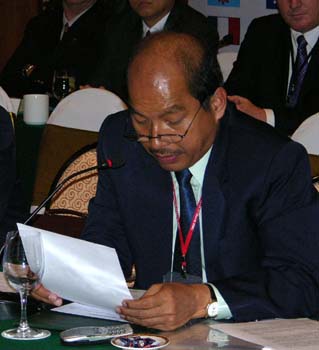

 I believe: This is a CoRRECT™ Video with a very positive message
I believe: This is a CoRRECT™ Video with a very positive message Walang Natira: Gloc-9's MTV Rap about the OFW Phenomenon
Walang Natira: Gloc-9's MTV Rap about the OFW Phenomenon

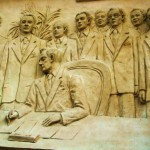







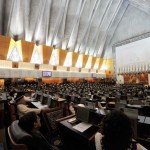

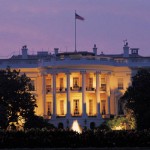
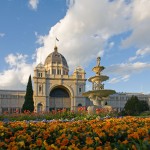
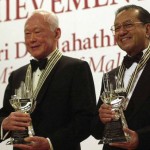












Aside from federalism, we could also adopt a highly devolved local government system (the same that is being used in UK in relation to Scotland and Northern Island, Spain).
In the case of the Philippines, the tier of local government may be revised into: Regions, Metropolises/Cities, Barangays. Provincial governments may be disbanded since it would only duplicate the tasks that may be vested in the Regions. This would reduce bureaucracy in the local scene and promote austerity.
Each Region must have a Premier (the President’s counterpart), an Executive (the Cabinet’s counterpart) led by a First Minister (the Prime Minister’s counterpart). Regional legislative power is vested in a Legislative Assembly composed of such Members of Legislative Assembly (MLAs) coming from parliamentary constituencies. In UK devolved assemblies, elections are done via block-voting (e.g. 6 MLAs per constituency). The Singaporean Parliament implements a similar system wherein constituencies return an MP and another group of MPs called “Group Representation Constituencies”. Judicial powers retain in a centralized court system.
Regional governments and assemblies are entitled to decide on issues, except of inter-regional or national matters: Agriculture, Forestry, Fisheries and Food; Tourism, Culture, Media and Sport; limited Economic Policy (regional taxation, etc.); Development; Education; Environment; local police force and Home Affairs; Local Government and Housing; Social Services; limited Trade and Industry (inward investments, promotion, etc.); and Transport.
Metropolises are those dubbed as “highly-industrialized cities” today. The same strong mayor-council may be used for metropolises and cities. The number of seats in the Council is fixed rather than today wherein the same depends on the number of electoral districts the city is composed.
Obviously, Metropolises and Cities are much bigger in this type of system. Current municipalities and lower-class cities may be dissolved and merged with metropolises or upper-class cities.
The same system for barangays will be used.
SK must be abolished. Sectoral MLAs or members of metropolis, city and barangay councils (for Youth, Labor Unions, Right group, etc.) will be appointed by the Premier, the Mayor and the Captain, respectively. They must be non-partisan and be selected from among nominations made by the people or organizations belonging to the same sector of representation.